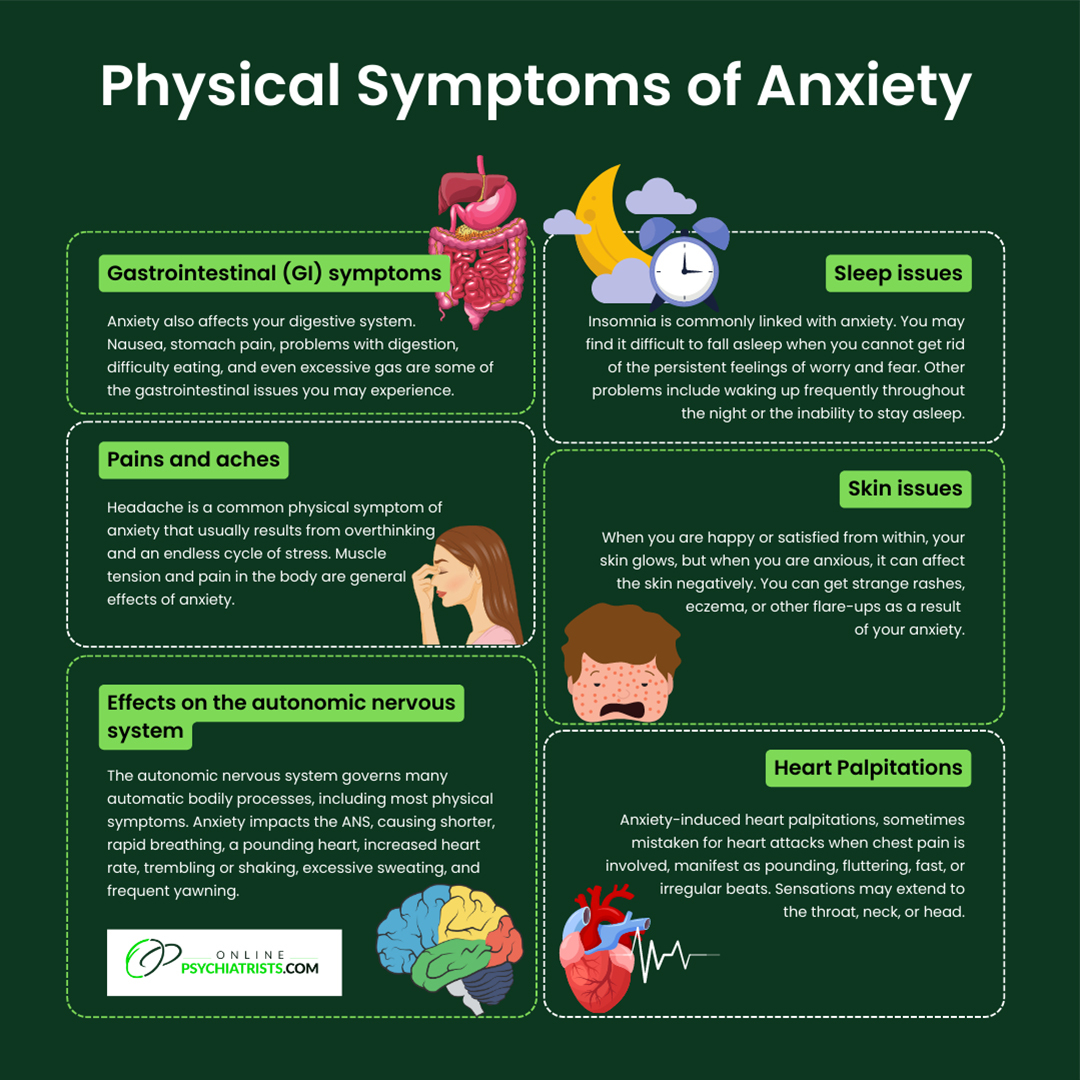

Table of contents
Most people struggling with an anxiety disorder face distress and challenges in daily life due to the impact it has on their bodies. If anxiety is affecting the way you eat, sleep, work, or your relationships, it is time to seek professional assistance. Dr. Zlatin Ivanov works with you to identify the anxiety-triggering factors and challenges you experience in daily life to reduce stress and the accompanying physical symptoms. He recommends a combination of therapy, medication management, and lifestyle changes that minimize the effects of anxiety on your body and make you feel better within no time.
The human body and mind have a complex connection which often makes it difficult to fully understand some of the problems we face. When it comes to our mental health, the symptoms affect our mood, behavior, and emotional processing, but they are not all. Many of the conditions that were at one time considered just to be in the head are very real and affect your physical health too.
Chronic or long-term anxiety can affect quality of life. Even though it is commonly known to cause behavioral changes, it can also have serious consequences on physical health. Living with anxiety can cause physical stress on the body, especially to the nervous, digestive, and immune systems.
Read more: Marriage Counseling: All You Need To Know
Anxiety can cause symptoms like restlessness, irritability, excessive worrying, racing thoughts, and inability to concentrate. While these symptoms cause a lot of stress, they are most localized to the mind and our overall mood and personality. These symptoms help define anxiety and related disorders, but it is not all - anxiety has physical impacts too.
Anxiety is not just in the head, you may be able to feel its effects physically. It is because when you are exposed to a perceived threat, your body triggers a response to help you focus and take action. Mental health conditions such as anxiety, stress, and depression can also have a negative impact on our bodies and result in various physical health issues like increased heart rate, sweating, or feeling sick to the stomach.
Here are some common physical symptoms of anxiety you may experience:
When your body feels threatened or faces stress, it triggers a flight or fights response and releases a flood of chemicals and hormones into the system to help you respond to that threat. It is a natural reaction and results in several physical responses in the body, including dilated pupils and directing our circulation away from the processes like digestion and toward muscle and other components of the body that are more helpful for immediate survival.
The physical symptoms caused by anxiety are equally troubling as the mental symptoms for a lot of people. Feeling like you are struggling to breathe and your heart is racing are common physical effects anxiety could have on your body.

Feeling chilled and having cold sensations is a common physical symptom of anxiety. Anxiety can alter how our body temperature feels. Chills are an especially confusing physical symptom, and you need to understand something is affecting your mood or emotions to make you feel this way. There may be multiple reasons that your anxiety could be making you feel cold.
Discussed here are some of the ways cold sensations and anxiety are connected:
Sensations of cold and chill are not the only symptoms associated with anxiety, but you may feel cold at the time you experience anxiety, as your body is struggling to cope. The physical effects that accompany the fight or flight response can make you feel cold.
Read more: 5 Most Common Behavioral Issues
Even though you have come up with ways to deal with psychological symptoms of anxiety, learning how to manage or treat the physical effects that anxiety has on your body is also significant. The physical effects are just as challenging to deal with as the impacts it has on the mind.
Fortunately, there are plenty of self-care-related adjustments you can make in life to cope with physical symptoms of anxiety successfully.
Your healthcare expert may suggest the following to manage your symptoms:
Yoga promotes a sense of calm both mentally and physically within the body. Research shows that relaxing strategies like yoga and meditation help reduce a lot of mental as well as physical symptoms associated with anxiety.
The impact of anxiety on the mind and body can be detrimental and intimidating to deal with. Even though you may want to attribute them to other reasons, symptoms like headaches, feeling cold or digestive issues can be a result of your anxiety. Call Online Psychiatrists now to find the best solution for your anxiety and the causes that affect your well-being. Dr. Zlatin Ivanov provides empathetic, judgment-free care and personalized treatment for your mental health issues. He helps you overcome the grip of anxiety and its unpleasant symptoms by addressing underlying causes and developing coping mechanisms that give you the energy to enjoy your life in a happier, healthier way.
 Our Locations
Our Locations
The Chrysler Building
405 Lexington Ave, #2601
New York, NY, 10174
Get Directions (Map)
300 Carnegie Center Drive #150K,
Princeton, NJ, 08540
Get Directions (Map)
701 Brickell Avenue, 1550#A,
Miami, FL, 33131
Get Directions (Map)